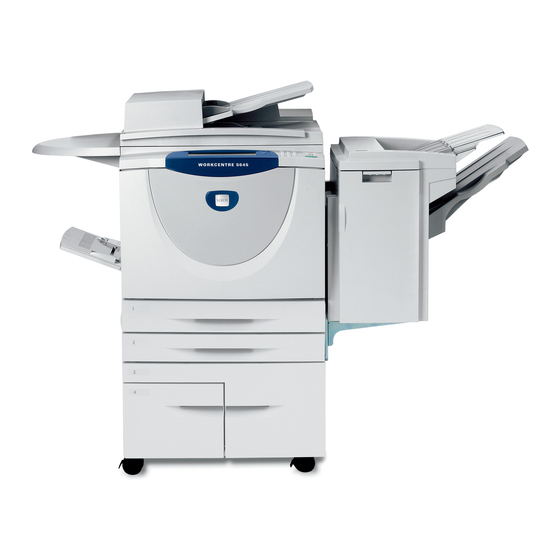Evaluate Productivity
In addition to actual print engine speed, consider the factors that affect overall throughput. Are the device's scanning and faxing
features powerful enough to support the demands of your busiest departments? Is the device appropriately sized for the entire work-
group? Can important features be used simultaneously, or are employees forced to wait for the device to become "free"? Is the system
designed to minimize network traffic? Can device functions be monitored from users' desktops and/or at the device?
How the WorkCentre 5600 Series exceeds the productivity requirement:
Speed
The productivity of the WorkCentre 5600 Series starts with seven output-engine-speed
options, which deliver output speeds from up to 32 ppm black-and-white to up to 90 ppm
black-and-white — ensuring the right fit for a wide array of office environments and work-
groups. Document handling speed is notable as well, with a 100-sheet DADH (75-sheet
DADH on WorkCentre 5632 and 5638) that scans single-sided documents at 60 or 85
ipm and double-sided documents at 28 or 38 ipm. With FPOTs ranging from as fast as 4.6
seconds to 2.7 seconds, users won't have to wait long for their jobs to get started, either.
Network Performance
Performance isn't limited to raw document feeds and speeds. All network-enabled
WorkCentre 5600 Series devices feature a new high-performance processor (1.2 GHz on
WorkCentre 5632, 5638, 5645 and 5655; 1.4 GHz on WorkCentre 5665, 5675 and 5687)
plus an 80 GB hard drive. It's ready and able to process your large, complex print and
scan jobs. In addition, 10/100/1000Base-TX Ethernet connectivity* comes standard on
WorkCentre 5632, 5638, 5645 and 5655 (10/100Base TX Ethernet on WorkCentre 5665,
5676 and 5687) for shared network printing, and optional adapters for IEEE802.5 (Token
Ring) and 10Base5, 802.11a/b/g wireless Ethernet ensure you can connect WorkCentre
5600 Series devices according to your company's specific needs.
The WorkCentre 5600 Series devices are easy on your network as well. With RAM colla-
tion, files are sent over the network just once no matter how many sets are printed. Job
pipelining allows the MFP to process print jobs even if the print engine is busy with an
earlier print job — thus optimizing system performance by avoiding delays during job
processing.
Image quality
With up to 4800 x 600 dpi interpolated copy resolution and up to 1200 x 1200 dpi print
resolution, the WorkCentre 5600 Series devices generate high-quality copies and prints
with crisp text and images. To ensure that printed output meets users' high expectations,
Xerox also delivers multiple Page Description Languages (PDLs) including PostScript
emulation, XPS, PCL
6 and PCL
®
Concurrency
The new WorkCentre controller's advanced design also helps avoid bottlenecks at the
front panel. Concurrent operation means you won't have to wait until a long print job
is complete to program a fax, scan or copy job. By keeping the front panel available for
programming while the print engine is busy, users stay productive and avoid idle time
waiting for the MFP. Scan and fax jobs can be programmed and executed without waiting
for the print engine to become available, while newly programmed copy jobs will join the
job queue and be executed when earlier jobs are completed.
*Does not apply to all models.
5e emulation, and HP-GL2.
®
In real-world network printing,
WorkCentre 5600 Series devices
outperform the competition.
3
®
TM
Xerox WorkCentre 5600 Series Evaluator Guide
9

